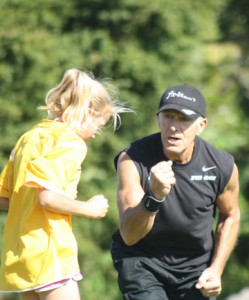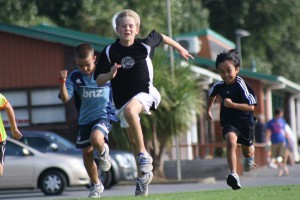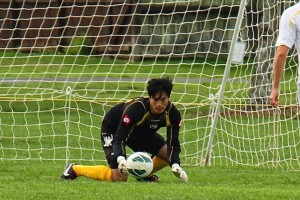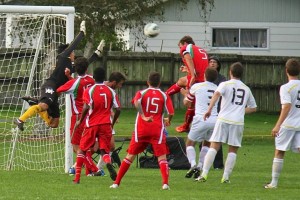By Sam Jeffery
The Disneyland of Football:
How Qatar’s staggering ASPIRE Football Dreams programme has helped an oil- rich nation on its quest for footballing recognition, attracted criticism but ultimately challenged the nature of conventional youth scouting.
When thinking about Qatar, the immediate association made is about a Gulf nation rich in natural resources, affluent to say the least. It certainly wouldn’t be for its sporting prowess. The awarding of the right to stage the FIFA 2022 World Cup has gone a long way to thrust Qatar into the limelight, but perhaps not in the way in which the ruling al-Thani family would have envisaged. Yet it is the sincere intent of the family to invest heavily in creating a sporting legacy in Qatar, and constructing an image to leave a footprint on the global sporting stage. Examples of Qatari-backed success are just beginning to form – al-Thani-owned Paris Saint Germain were recently crowned Ligue 1 champions for the second year running, whilst just last year Just the Judge, owned by Qatar Bloodstock Racing, won a first Group One horse racing Classic. Yet it is the lesser known, though genuinely startling, ASPIRE Football Dreams programme that is changing the very face of football scouting, and may well ensure Qatar’s place at the table of global sporting acceptance.
When former Eastern Suburbs coach, New Zealand Knights manager and Fulham FC youth coach Paul Nevin stepped into the headquarters of Qatar’s ASPIRE programme in Doha back in 2007 he was blown away by what he describes as the “best facilities on the planet”. Paul had received a call from a long-time contact in the English game to say that Qatar were seeking elite international coaches to join an ambitious project that would put Qatar “on the map”.
“I’d initially planned on staying a year, gaining some more international experience, and moving on. I ended up staying five years; I worked in the Disneyland of Football“.
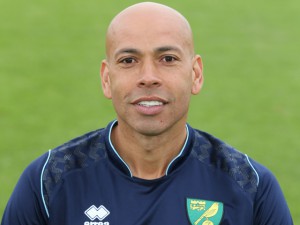
ASPIRE Initiative
By way of background, in 2004, funded by the ruling al-Thani royal family in Qatar, the ASPIRE programme opened its doors with the steadfast intention of “developing champions for Qatar” across a range of sporting disciplines. With an “empty shell” to fill with the very best coaches the world could provide, elite performance experts from across the globe were lured to Doha; from the Australian Institute of Sport to France’s INSEP, industry leaders in Sports Science and sporting excellence were recruited.
Nevin joined the ASPIRE initiative in 2007, and discovered a footballing academy akin to that of a European club, but on a national basis.
“The ASPIRE academy runs from Under 9s through to Under 19s, with the intention of developing Qatari players for the national team. But one of the major flaws was a lack of competition locally to test the side against”.
Upon its inception it was not long before major European and international sides were being sent to Doha to take on the various age groups of the ASPIRE Academy.
“At the start of the academy the teams would lose 8, 9, 10-0; but by the end of the 5 years I was there – when we played teams like Real Madrid, Barcelona, PSG and the Brazil National Team – we’d be winning a lot of the games”.
Nevin was a senior member of a vast coaching team recruited internationally. With an effectively limitless budget and ambition to match, the al-Thani family invested in coaches from a staggering 34 different countries and from some of the most elite clubs in Europe.
“I had coaches working under me from clubs like Barcelona, Everton, Juventus and Ajax. It certainly wasn’t easy managing them all”.
With this elite structure in place Nevin and Co were tasked with scouting and developing all the potential Qatar had to offer. Given that Doha is effectively half the size of Auckland, after a finite amount of recruitment the footballing talent pool domestically was farmed to its maximum.
“We had the domestic programme up and running – our academy had all the mechanisms to work. That’s when Josep was brought in and Football Dreams started”, Nevin states.
Football Dreams
The “Josep” to whom Nevin refers is Josep Colomer, former Director of the Barcelona Academy La Masia, brought into the ASPIRE set-up as Head of Recruitment and charged with cementing ASPIRE as the world’s best football academy. Famously lauded as the person to have discovered Lionel Messi, Colomer is the architect of the Football Dreams programme.
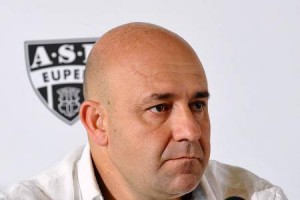
The colossal project, sponsored by Nike and partnered with UNICEF, is now in its fifth year, and offers young players (aged 13) from developing nations across the globe the chance of a scholarship at ASPIRE’s lauded academy. It was devised as a chance to develop the Qatari national side by allowing the home nation’s elite to train and “learn off the best” from around the world, whilst at the same time delivering a truly humanitarian project that conclusively falls under FIFA’s social principle that “football can assist the developing world and create a positive social impact”.
“We were giving young players the chance for a scholarship at the academy, a chance of superior education, to nurture them, and to give them a platform to go and succeed either in their home countries, in Europe or across the world”.
The numbers behind the project are as gargantuan as they are staggering. In the 2013 project as many as 750,000 youngsters were tested, across 60,000 matches, 80 playing fields and 15 countries (10 in Africa, 2 in Asia, 3 in South and Central America).
Nevin explains the logistics behind the numbers,
“Take Cameroon for example. ASPIRE would send coaches (mainly Spanish thanks to Josep’s links) and enlist around 6000 volunteers in Africa to do the initial scouting. Anything from 60-80,000 13 year-old children would turn up with their passports across 12 fields in the North, South, East, West of Cameroon.
This would be whittled down to 40, 20, and 10,000 and so on, until a final 50 were selected. I would then fly in along with a goalkeeping coach and physical coach and at the national stadium [in Yaoundé] we’d stage a week of tests and games. From the initial thousands, we would select 3 to come back to Qatar for the chance of a scholarship”.
And so such immense scouting occurs across Africa, in Central America, and in Asia. 3 of the best are selected from each nation and the lucky fifty are flown into Doha and the footballing “Disneyland” for a month of intense training, testing and game time. Only then are the very best 3 or 4 gifted the golden ticket and offered the full scholarship at ASPIRE. It is a process that defies belief in sheer magnitude and cost, but one that Nevin argues is both genuinely humanitarian and groundbreaking.
“Besides the obvious benefits of the scholarship, where ASPIRE Football Dreams has given a chance to players in places like Africa who would die for a chance to play football, it’s had other enormous impacts on these countries”.
Nevin points to examples such as the donation of hundreds of thousands of mosquito nets to malaria-affected areas of Africa; all the nets are embroidered with images of Messi and Andreas Iniesta to entreat youngsters to use them. He also highlights the perhaps unnoticed benefits of ASPIRE entering the less developed nations.
“When the 3 best 13 year-olds are selected to come from the 50 for the trial in Qatar, 47 are obviously left behind. Therefore countries such as Vietnam and Ivory Coast – countries that cannot afford elite football scouting and coaching – have now effectively had the best 47 players scouted for them”.
Furthermore the time spent by ASPIRE coaches, and funding provided to these nations, helps develop youth scouting systems and methods, all with the underlying benefit of assisting the respective FAs and national teams.
It should also be noted that those that do not make the final cut in Doha are given the opportunity to live and train at the ASPIRE Senegal academy, a place Nevin describes as “one of the most fantastic place I’ve ever worked”.
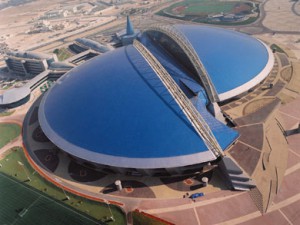
Motives
Given the magnitude of the project it’s clear that successes are a not so much a target, but a prerequisite. Equally, with such an investment must surely come a sought end game?
When Football Dreams initially started sceptics chimed that Qatar was simply handing out passports to winners of the scholarship. This has been strenuously denied by Qatari officials and has certainly not proved the case. Andreas Bleicher, Chief Executive of ASPIRE Football Dreams stated “we are not requiring them [the scholars] to play for Qatar”.
It should be noted that any player wishing to adopt another nationality and be naturalised can only do so 5 years after turning 18, so effectively aged 23. Given that these are the very best young players from across the globe, it is safe to assume they will be selected by their home nations before the age of 23; an assumption given solid substance when you consider that 30 ASPIRE Football Dreams graduates have represented as many as 10 Home Nations at varying youth levels.
“It’s all about coverage. Qatar wants to be in the public domain, and become a valid footballing nation. PSG and Malaga are investments, and the Qatar Foundation is partnered with Barcelona, but Football Dreams can give Qatar world recognition.”
Whilst a number of ASPIRE graduates have represented their home nations internationally there are yet to be any major breakthroughs in a European club. Nevin argues that once this happens then ASPIRE will have the true recognition it seeks.
“It would put them on the map. A role model to play in a bigger team would be massive”.
Scepticism
When Qatar was awarded the 2022 World Cup there was an enormous amount of criticism levelled at both FIFA and the chosen hosts. Accusations of corruption and vote- buying were rife but have proven unsubstantiated. The Football Dreams initiative certainly came under the microscope, particularly when considering that a number of the countries that sit on FIFA’s Executive Committee (that decides where the World Cup is staged) are also places in which ASPIRE undertakes its scouting.
However there is no evidence to suggest foul play, and in fact one could go so far as to say that it would make good business sense to illicit a level of awareness from potential voters, much like a politician canvassing for votes ahead of an upcoming election. In practice, if Qatar’s ASPIRE undertook a humanitarian project that clearly provided much needed funding and infrastructure benefits in a downtrodden country, it would seem perfectly justifiable to look favourably on them as a nation.
There is no rule-breaking and nothing illegal, and in fact criticism should not tarnish the work that the Football Dreams programme has done and continues to do.
The Future
Having left last year (he will join Norwich City ahead of the coming season) Nevin is able to look back fondly on an enormous improvement over the 5 years at ASPIRE.
“I took the 1994 group to Spain to play Barcelona, Villarreal, Espanyol, Valencia and both Madrid teams – we won every game.”
In the 2011 Milk Cup in Ireland – a tournament previously graced by some of the best young players (Messrs Beckham and Scholes spring to mind) – an ASPIRE side crushed Manchester United 5-1 in the final.
It would be fair to say that improvements have been vast, and there seems no reason to not continue this upward curve.
ASPIRE recently purchased Belgium second division side KAS Eupen and the squad now consists of 15 players from the Qatar based academy along with 2 from Senegal. Giving the players the exposure of being away from home, the comforts of a sheltered life in Qatar, and some valuable life experience is deemed pivotal to the ability to succeed. Of course given Belgium’s loose work permit regulations it will also help facilitate possible moves to other European clubs.
There have been marked successes for ASPIRE graduates, with over 30 representing home nations at varying levels. With an underlying goal to improve the standard of Qatari footballers through assimilation with the best talent the world can offer, it can be noted that players such as Muhammed Naim, Saad Al-Sheeb, Ibrahim Majid and Fahad Khalfan have all gone on to represent Qatar; all are graduates of ASPIRE.
With former ASPIRE coach Fahad Thani now managing the national side, and able to utilise first-hand knowledge of the up and coming players through youth ranks, it would appear the goal of creating Qatari champions may well be on track.
The Football Dreams programme is an outlandish proposition. No mere publicity stunt, it is the latest investment by the Qatari Royal Family to help facilitate a growing sporting superiority for aspiring Qataris, and to catapult this small Gulf nation into the spotlight for its sporting prowess.
It is an initiative that stretches the very boundaries of what can be achieved with the right personnel in charge, the right structure in place and of course necessary investment; Qatar’s Football Dreams is the most extensive scouting network the world has seen.
Of course to truly earn international respect, the results must appear credible, and whilst there are undoubtedly a number of successes at youth levels worldwide and within Qatar’s own international team, the need for an ASPIRE graduate to truly “make it” in a top flight team is still unfulfilled.
One suspects it is only a matter of time before this football dream is turned into a football reality.

